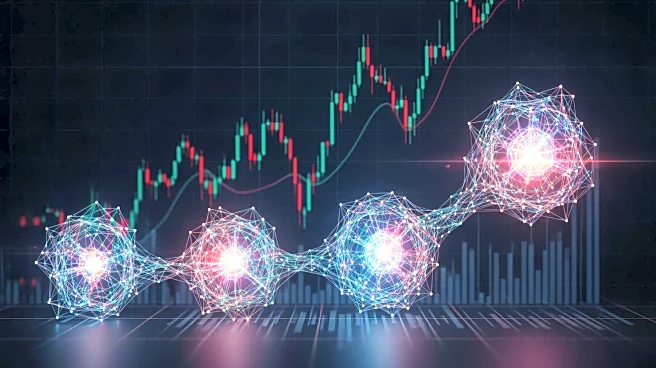What's Happening?
The U.S. stock market is experiencing significant growth, driven by substantial investments in artificial intelligence. The Nasdaq Composite Index has doubled over the past three years, reflecting a surge
reminiscent of the late 1990s dot-com bubble. Federal Reserve Chairman Jerome Powell has noted that stocks are 'fairly highly valued,' while billionaire investor Paul Tudor Jones has warned that the current 'Bubble 2.0' could be more explosive than the previous one. The 'Buffett Indicator,' a measure of total stock market valuation relative to the U.S. economy, has surpassed 210%, exceeding its peak during the dot-com era. Despite concerns, some analysts believe there is still room for growth in the AI sector.
Why It's Important?
The current stock market boom, fueled by AI investments, has significant implications for the U.S. economy and investors. The parallels to the dot-com bubble raise concerns about potential market instability and the sustainability of current valuations. If the market were to correct, it could lead to substantial financial losses for investors and impact economic growth. The situation highlights the importance of cautious investment strategies and the need for regulatory oversight to prevent a repeat of past market crashes. Stakeholders, including investors and policymakers, must navigate the balance between fostering innovation and ensuring economic stability.
What's Next?
Market analysts and investors are closely monitoring the situation, with some predicting continued growth in the AI sector, while others caution about a potential market correction. The timing of any downturn remains uncertain, as historical precedents show that predicting the exact moment of a bubble burst is challenging. Financial leaders, such as JP Morgan Chase CEO Jamie Dimon, express concern over a possible correction but acknowledge the difficulty in timing such events. The ongoing developments in AI technology and investment will likely influence future market trends and economic policies.
Beyond the Headlines
The AI-driven stock market boom raises ethical and economic questions about the concentration of wealth and power among a few tech giants. The circular nature of investment deals among these companies may limit broader economic benefits and exacerbate income inequality. Additionally, the rapid pace of AI advancements poses challenges for workforce adaptation and regulatory frameworks. Long-term shifts in employment patterns and industry dynamics could result from the continued integration of AI technologies.









